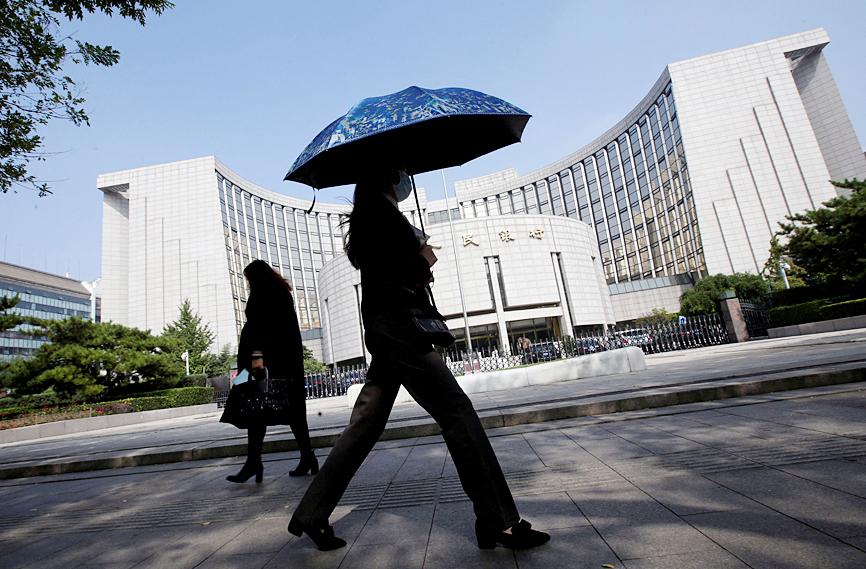China’s central bank could further ease monetary policy in the first half of this year to stave off headwinds and ensure economic stability, a Bloomberg survey of economists showed.
The People’s Bank of China (PBOC) is expected to lower the amount of money banks must keep in reserve in the first quarter of this year, bringing down the ratio for major banks to 11 percent.
Major policy interest rates — the one-year medium-term lending facility rate, one-year loan prime rate and seven-day reverse repurchase rate — are likely to be reduced by 10 basis points each in the second quarter, the survey said.

Photo: Reuters
China’s economic growth slowed to 4 percent in the final three months of last year, and the government and central bank have made clear there would be more action this year to support expansion and stabilize the economy.
The central bank cut borrowing costs earlier this week, with banks following the move on Thursday by reducing the interest rate on one-year and five-year loans.
“The PBOC is going to ease monetary policy more proactively. That means it will not wait until the GDP data shows weakness of the economy,” ING Bank Hong Kong chief China economist Iris Pang (彭藹嬈) said. “Fiscal spending on infrastructure investments are likely to speed up, which will give GDP growth a boost.”
Two front-page reports in major financial newspapers yesterday said that China would likely introduce more policies to support economic growth.
Other major points in the survey showed that the median growth forecast for this year continues to be 5.2 percent, while the outlook for next year was lowered to 5.2 percent from 5.3 percent.
Factory inflation is seen moderating to 3.7 percent, while fixed-asset investment and retail sales growth were higher at 5.3 percent and 6.8 percent respectively.

In Italy’s storied gold-making hubs, jewelers are reworking their designs to trim gold content as they race to blunt the effect of record prices and appeal to shoppers watching their budgets. Gold prices hit a record high on Thursday, surging near US$5,600 an ounce, more than double a year ago as geopolitical concerns and jitters over trade pushed investors toward the safe-haven asset. The rally is putting undue pressure on small artisans as they face mounting demands from customers, including international brands, to produce cheaper items, from signature pieces to wedding rings, according to interviews with four independent jewelers in Italy’s main

Macronix International Co (旺宏), the world’s biggest NOR flash memory supplier, yesterday said it would spend NT$22 billion (US$699.1 million) on capacity expansion this year to increase its production of mid-to-low-density memory chips as the world’s major memorychip suppliers are phasing out the market. The company said its planned capital expenditures are about 11 times higher than the NT$1.8 billion it spent on new facilities and equipment last year. A majority of this year’s outlay would be allocated to step up capacity of multi-level cell (MLC) NAND flash memory chips, which are used in embedded multimedia cards (eMMC), a managed

Japanese Prime Minister Sanae Takaichi has talked up the benefits of a weaker yen in a campaign speech, adopting a tone at odds with her finance ministry, which has refused to rule out any options to counter excessive foreign exchange volatility. Takaichi later softened her stance, saying she did not have a preference for the yen’s direction. “People say the weak yen is bad right now, but for export industries, it’s a major opportunity,” Takaichi said on Saturday at a rally for Liberal Democratic Party candidate Daishiro Yamagiwa in Kanagawa Prefecture ahead of a snap election on Sunday. “Whether it’s selling food or

In the wake of strong global demand for AI applications, Taiwan’s export-oriented economy accelerated with the composite index of economic indicators flashing the first “red” light in December for one year, indicating the economy is in booming mode, the National Development Council (NDC) said yesterday. Moreover, the index of leading indicators, which gauges the potential state of the economy over the next six months, also moved higher in December amid growing optimism over the outlook, the NDC said. In December, the index of economic indicators rose one point from a month earlier to 38, at the lower end of the “red” light.